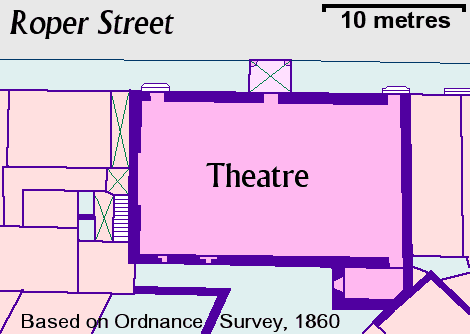

The beginnings of Whitehaven's theatre, 1769-82
According to research published in an article by J. Roderick Webb in the Northern Review (vol. 2 no. 2, Oct. 1947), theatrical performances were given at the Assembly Room in Howgill Street, Whitehaven, from at least 1756 (the date of a surviving play-bill), and in October 1767, the imminent opening of a new theatre on Albion Street was announced. That opening may, however, have been delayed, for the following report appears in the London Public Advertiser for 28 October 1768:
"The New Theatre at Whitehaven being elegantly fitted up, it was opened on the 12th instant; when the Clandestine Marriage, and Thomas and Sally, were performed to a polite and numerous audience."
It has long been known that the theatre on Roper Street in Whitehaven, Cumbria, which served the town until early in the 20th century, was opened in 1769- Webb notes the existence of a deed for the site, dated March of that year, and again, a playbill for one of the earliest performances was preserved. However, because there was no newspaper published in Cumbria at the time, details of the theatre's beginnings have remained somewhat obscure. Luckily though, the founders of the theatre came from Newcastle upon Tyne, where newspapers had been published for several decades, and the Newcastle Courant was happy to report on the local company's westward expansion:
Newcastle Courant, 25 Feb 1769
We hear there is a new and elegant THEATRE now building at Whitehaven, for Messrs Austin and Heatton's Company of COMEDIANS, by subscription of eight of the principal gentlemen of that place, and that it is to be built after the plan of the Theatre Royal in Dublin, which is in a cemi circle, and when finished will be as elegant a Theatre as any in England, London excepted.
 [It is not clear what is meant by the claim that the Dublin Theatre Royal was in a "cemi circle". Judging from John Thomas Gilbert's "History of the City of Dublin" (1859) the notable thing about the Theatre Royal, on Crow Street, was not any oddity of shape (it seems to have had the normal arrangement of a rectangular auditorium with gallery, 15.5 metres wide, with a stage 11 metres wide, overlooked by boxes on both sides) but the depth of the stage from front to back- an impressive 27.5 metres, enabling, for example, a warrior king to make a grand entrance on a chariot. Compare those measurements with the plan here of the Whitehaven theatre!]
[It is not clear what is meant by the claim that the Dublin Theatre Royal was in a "cemi circle". Judging from John Thomas Gilbert's "History of the City of Dublin" (1859) the notable thing about the Theatre Royal, on Crow Street, was not any oddity of shape (it seems to have had the normal arrangement of a rectangular auditorium with gallery, 15.5 metres wide, with a stage 11 metres wide, overlooked by boxes on both sides) but the depth of the stage from front to back- an impressive 27.5 metres, enabling, for example, a warrior king to make a grand entrance on a chariot. Compare those measurements with the plan here of the Whitehaven theatre!]
Newcastle Courant, 1 Apr 1769
We hear that the Wood Hall in West Chester, is now fitting up in an elegant theatrical manner, for the reception of Mess. Austin and Heatton's Company of Comedians, to perform there the ensuing summer; and that a Subscription will be opened in the race week (which is already honoured with the patronage of some persons of distinction) for the building a new Theatre, for which, it is said, great interest is making to procure his Majesty's Royal Licence.
[Clearly the company was in the throes of a major expansion in 1769. "West Chester," by the way, is Chester in Cheshire, as distinct from Chester near Newcastle, now officially known as Chester-le-Street]
Newcastle Courant, 8 Apr 1769
York, April 4. We hear that his Majesty's patent for licensing the York and Hull theatres has gone through the several offices, and will be here on Friday next; and that the theatre will be opened under the sanction of it on Saturday the 8th instant.
[The York theatre had been opened several years earlier, but in 1768 its manager, Tate Wilkinson, had decided to expand and open another in Hull. It seems that Austin and Heatton's expansion was partly intended to restrict Wilkinson's. According to Wikipedia, Wilkinson's patent, giving him the right to use the name "Theatre Royal" in Hull and York, cost him £500.]
Newcastle Courant, 18 Nov 1769
Whitehaven, Nov 14. Our Theatre, which is built upon the model of that in Crow-street, Dublin, is now most elegantly fitted up, and is allowed to be as neat and more convenient than any other in England: It was opened with great applause on Wednesday the 8th inst. by Mess. Heatton and Austin's Company of Comedians, with the Busy Body, and Wit's Last Stake, to a very numerous and genteel audience.
["The Busy Body" written in 1709 by Susanna Centlivre, was one of the most popular plays of the 18th and early 19th centuries, a hectic comedy of arranged marriage versus true love. "Wit's Last Stake" by Thomas King, was the latest hit farce from London, first performed in 1768. N.B. In the Prologue below, Melpomene was the Muse of Tragedy in Greek legend; "The Padlock", misspelled in the Prologue, was another 1768 theatrical hit, a comic opera with a West Indian slave as its central character (then played by a white actor in makeup, but later a successful role for black actors)]